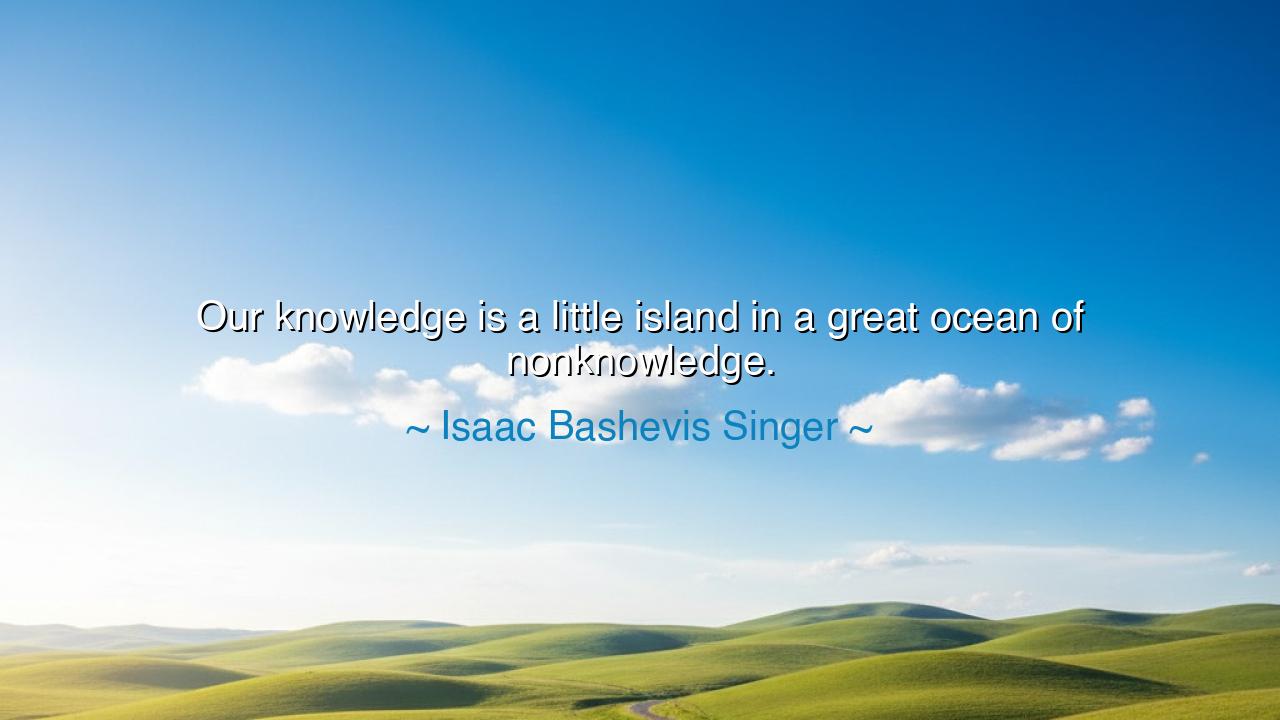
Our knowledge is a little island in a great ocean of






Hear the haunting words of Isaac Bashevis Singer: “Our knowledge is a little island in a great ocean of nonknowledge.” In this vision, the human mind is not master of the universe but a humble traveler, standing upon a small shore while the infinite waves of mystery crash all around. What we call knowledge is precious, yet it is but a fragment, a brief clearing amidst vast unknown forests, a flicker of light surrounded by endless night. This truth, spoken by Singer, reminds us of humility, for even the wisest among us are but children building castles of sand on the edge of eternity.
The ancients, too, grasped this truth. The philosophers of Greece and the mystics of the East often warned that man’s wisdom is narrow and fragile. They gazed upon the stars and saw infinity, and they bowed their heads in reverence. To call our learning an island is to acknowledge its limits: it has boundaries, it is surrounded, it is small. And yet, though it is small, it is real—it is solid ground. We must treasure our island of knowledge, even as we admit that the vast ocean dwarfs it beyond imagining.
History gives us many tales to prove this. When the sailors of the Renaissance first pushed beyond the familiar coasts of Europe, they believed they had mapped the world. Yet each voyage revealed more lands, more peoples, more mysteries than they had dreamed. Columbus sought Asia and found the Americas; Magellan sought a route to riches and found the endless Pacific. Each discovery widened their island of knowledge, but it also revealed how immense the ocean of nonknowledge truly was.
So it is with science. When Newton revealed the laws of motion, men thought the universe was conquered. Yet his truths gave birth to questions he could not answer. Later came Einstein, who bent the fabric of space and time, and again men thought the mysteries were solved. But even Einstein’s light revealed deeper shadows—quantum worlds, dark matter, and cosmic abysses still unexplained. Each discovery builds our island larger, yet with each step the ocean around us grows more visible, more vast, more unfathomable.
This is not cause for despair, but for wonder. For if all were known, life would lose its fire, its yearning, its divine curiosity. The greatness of man lies not in conquering the ocean, but in standing upon the island with courage, gazing into the infinite waves and daring still to learn, to seek, to dream. Our nonknowledge is not our enemy—it is our horizon. It calls us forward, it whispers of treasures hidden beyond sight, it humbles us while it also exalts us.
The lesson, then, is to live as seekers. Do not cling so tightly to your little island that you think it is the world. Do not grow proud of your small portion of truth, for pride builds walls while humility builds ships. Instead, let your knowledge be the anchor that steadies you, and your nonknowledge the wind that drives you to explore. Rejoice in the mysteries you do not yet understand, for they are the promise of tomorrow’s discoveries.
What must you do? Learn diligently, yet remain humble. Expand your island of knowledge, but never despise the surrounding ocean. Let wonder guide your steps, and let awe temper your speech. Ask questions without fear, and accept that some answers may never come. For wisdom is not to claim mastery of the sea, but to know one’s place upon the shore, and yet still dare to launch into the waves.
Therefore remember Singer’s words. Our knowledge is but an island, small and fragile, yet real and glorious, set amidst a boundless ocean of nonknowledge. Treasure the island, but love also the ocean—for in its mystery lies the endless journey of the soul.






AAdministratorAdministrator
Welcome, honored guests. Please leave a comment, we will respond soon